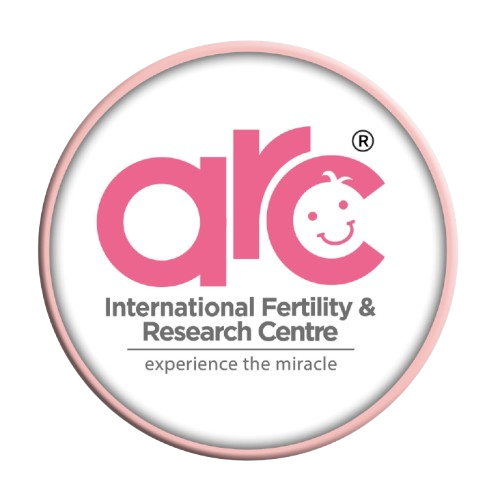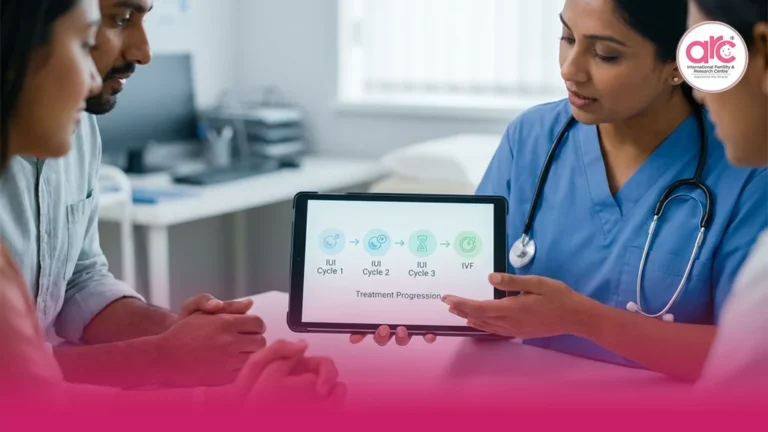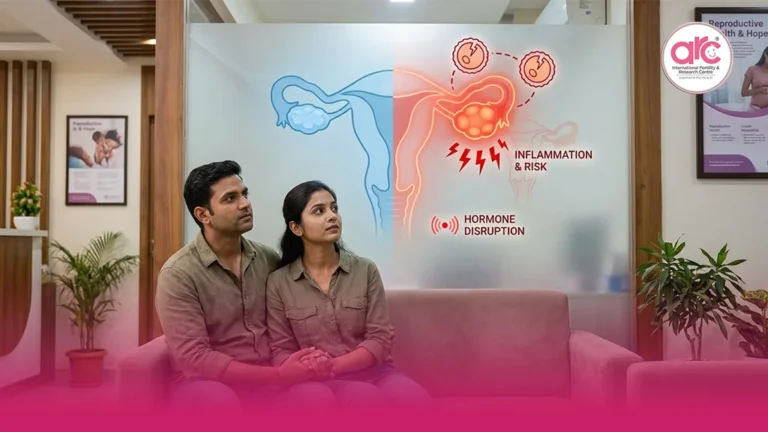Overview
Discipline in medicine is like discipline in life. When we know the process, the path becomes simple. Many couples who walk into ourfertility hospital in Chennai come with one common question — “Doctor, what is the difference between IVF and ICSI?”
Let’s answer it clearly, with facts and without medical jargon.
The Foundation — What Happens in IVF
IVF stands for In Vitro Fertilization.
“In vitro” means “in glass.” The egg and sperm meet outside the body, in a lab dish.
Step by step, this is how IVF treatment works:
- Ovarian Stimulation – The woman takes medicines to produce multiple eggs.
- Egg Retrieval – The matured eggs are collected using a fine needle.
- Sperm Collection – The partner provides a semen sample.
- Fertilization – The eggs and sperm are placed together in a dish. The sperm swim toward the egg naturally and fertilize it.
- Embryo Culture – The fertilized eggs grow into embryos.
- Embryo Transfer – A healthy embryo is placed into the woman’s uterus.
That’s IVF — a structured process, guided by science and patience.
(You can read our detailed guide on IVF treatment step by step to understand each stage in depth.)
The Shift — Why ICSI Was Developed
In the 1990s, scientists faced a major challenge — male infertility.
Some men had low sperm count, or poor sperm movement, or sperm that couldn’t penetrate the egg.
For such couples, IVF often failed. That’s when ICSI was born.
ICSI stands for Intracytoplasmic Sperm Injection.
Here, the embryologist selects a single healthy sperm under a microscope and injects it directly into the egg.
One sperm. One egg. One shot.
It’s precise, technical, and life-changing for men with severe sperm issues.
The Core Difference — Natural vs Assisted Fertilization
The biggest difference between IVF and ICSI lies in how fertilization happens.
| Step | IVF | ICSI |
|---|---|---|
| Fertilization Method | The sperm and egg meet naturally in a dish | One sperm is manually injected into the egg |
| Ideal For | Normal sperm parameters | Low sperm count, poor motility, failed previous IVF |
| Human Intervention | Minimal – sperm compete naturally | Maximum – sperm chosen and injected |
| Success Rates | Depends on sperm quality | Often higher in male-factor infertility |
| Cost | Relatively lower | Slightly higher due to lab expertise |
In simple words:
IVF lets nature take its course under supervision.
ICSI gives science the steering wheel when nature struggles.
The Decision — Which Is Better?
There is no “better.” There is only “what fits you better.”
At ARC Fertility Hospitals, the choice is made after detailed evaluation — sperm analysis, hormonal tests, ultrasound scans, and medical history.
If the male partner has normal sperm count and motility, IVF is usually preferred.
If there’s low sperm count or poor sperm movement, ICSI gives a higher chance of success.
Sometimes, couples combine both — a few eggs are fertilized naturally (IVF), and a few through ICSI. This dual approach offers both natural selection and scientific precision.
The Process — Skill and Science Together
ICSI is not just a machine-based procedure. It’s craftsmanship.
Under a microscope magnifying over 400 times, the embryologist picks one perfect sperm. A needle thinner than a hair carries it into the egg.
It demands steady hands, years of experience, and an ethical approach — qualities our embryologists at the best fertility hospital in Chennai bring to every case.
This precision ensures that even men with extremely low sperm count or previously failed cycles have a fair chance at fatherhood.
The Results — What Global Research Says
According to studies from Cleveland Clinic, Mayo Clinic, and WebMD, both IVF and ICSI have similar pregnancy rates when used for the right cases.
However, ICSI has shown higher fertilization success in cases of:
- Low sperm count
- Poor sperm movement
- Abnormal sperm shape
- Unexplained infertility
- Previous IVF failures
Yet, medical experts agree on one thing — the skill of the lab and the doctor determines the outcome as much as the technique itself.
That’s why choosing the right fertility hospital in Chennai is not just about technology — it’s about ethics, experience, and trust.
The Human Side — Beyond Numbers and Needles
Let’s not forget — IVF or ICSI is not a competition.
It’s a journey of patience, science, and hope.
Every couple who walks through our door carries more than reports — they carry dreams.
And every treatment plan we create respects that dream with honesty.
We don’t sell shortcuts. We explain the truth.
Because real success comes from clarity, not confusion.
The Closing Thought — The Right Choice Begins with the Right Questions
If you’re still unsure which treatment suits you, start with this question:
“What is stopping fertilization — egg health, sperm quality, or timing?”
Once that’s clear, the answer to IVF vs ICSI becomes simple.
At ARC Fertility Hospitals, we combine modern science with personal attention — guiding you with honesty and care.
Because in fertility, as in life, clarity is power.
ARC Fertility Hospitals
Visit arcivf.com to learn more or consult our specialists today.
Read related articles on IVF treatment step by step, low sperm count, and why we’re trusted as the best fertility hospital in Chennai.
Final Words
Discipline builds results — in the gym, in the office, and even in the lab.
IVF and ICSI are two paths toward the same goal — a healthy life, built on truth and trust.
When science and sincerity meet, miracles follow.




